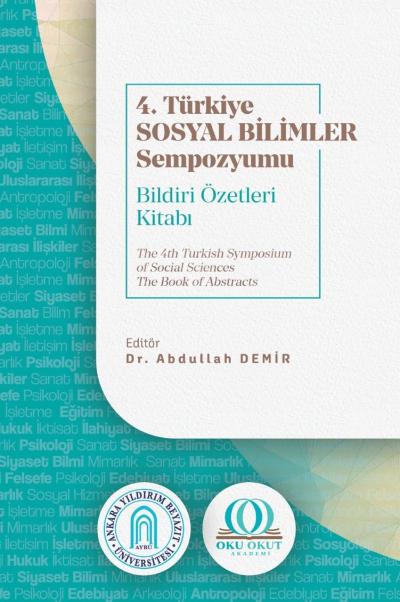Oku Okut Yayınları, kitabın yayım ve dağıtım hakkını saklı tutar. Ticari kullanım için yayınevine başvurulması gerekir.
Self Orientalism in Turkish Literature: The Example of the Novels ‘Sergüzeşt’ and ‘Sessiz Ev’
Türk Edebiyatında Self Oryantalizm: ‘Sergüzeşt’ ve ‘Sessiz Ev’ Romanları Örneği
Yazarlar
-
Yüksek Lisans Öğrencisi Süleyman Çelikhttps://orcid.org/0000-0001-9958-6635
The East and the West, which have been in interaction for centuries, have harbored a desire to understand and discover one another. These discoveries have brought about perceptions of identity and image. Orientalism, which emerged as a discipline of social sciences, has studied these interactions. Today, the concept that was once considered within the East-West dichotomy has been replaced by the notion of self-orientalism, which arises from the Eastern individual's need to define themselves in relation to the West. The traditional Orientalist perspective of the West has most significantly impacted the social structure of the East, urban life, and the daily lives of both Muslims and non-Muslims. According to the West, the East has lagged behind in areas such as art, philosophy, science, and knowledge production, and has been preoccupied solely with basic needs such as food, drink, and shelter. This notion led the West to form the idea of bringing civilization to the East, plunging the Western world into a struggle that has lasted for centuries. This influence extended to the point where the Eastern individual began to define themselves through the Western gaze. This self-definition has been associated with a new concept known as self-orientalism. The first traces of self-orientalism in Turkish literature can be seen in the early Western-style novels written under the influence of the modernization movements that began after the Tanzimat era. In the evolving literary journey, the effort to strengthen Turkish literature and the novel was. The term coined by Western hegemony, modernization, brought about a transformation in our literature, and with the Tanzimat period, the transition from traditional to Westernized ways began. This transition was felt by authors in both adapted and original works, reflected in the types and characters they created, and incorporated into the narrative. motivated by the concern of writing 'contemporary and modern' literary works and the pursuit of Westernization. The contact with the West and the state of being deeply intertwined with it have made self-orientalism visibly present in contemporary literature. In his novel Sergüzeşt, written within the framework of Westernized (alafranga) and traditional (alaturka) lifestyles, Samipaşazade Sezai Bey at times approached issues from the perspective of a Western Orientalist. He employed the subjective language and discourse of 19th-century Western Orientalism in his critiques and depictions of local life.One of the most criticized authors in contemporary literature for producing self-orientalist literary texts is Orhan Pamuk. Through his narratives, Orhan Pamuk has made self-orientalist discourses an integral part of his style, giving functionality to the critiques that have persisted from the Tanzimat era to the postmodern period.
Yüzyıllardır etkileşim içerisinde olan Doğu ve Batı, birbirini tanıma ve keşfetme arzusu duymuştur. Bu keşifler kimlik, imaj algılarını beraberinde getirmiştir. Sosyal bilimlerin bir disiplini olarak doğan Oryantalizm, bu etkileşimleri incelemiştir. Günümüzde Doğu-Batı ikileminde düşünülmeyen kavram, Doğulu’nun Batı’ya göre kendini tanımlama ihtiyacı hissetmesiyle ortaya çıkan self oryantalizm düşüncesine yerini bırakmıştır. Batı’nın geleneksel oryantalist bakış açısı en fazla Doğu’nun toplum yapısına, şehir hayatına, Müslim ve gayrimüslimlerin günlük yaşantısına etki etmiştir. Batı’ya göre Doğu; sanat, felsefe, bilim ve bilgi üretimi konusunda Batı’nın gerisinde kalmış ve sadece yemek, içmek, barınmak gibi temel ihtiyaçlarıyla meşgul olmuştur. Bu düşünce Doğu’ya da medeniyetinin gitmesi fikrini Batı’da oluşturmuş ve Batı dünyasını yüzyıllardır süregelen bir mücadelenin içerisine sokmuştur. Bu etkilenme Doğulu’nun kendini Batılı gözle tanımlamasına kadar gitmiştir. Bu tanımlama yeni bir kavram olan self oryantalizm ile bağdaştırılmıştır. Türk edebiyatında self oryantalizmin ilk nüvelerini, Tanzimat sonrası başlayan modernleşme hareketlerinin etkisi altında kaleme alınan Batılı tarzda ilk romanlarda görmek mümkündür. İlerleyen edebi serüvende ''çağdaş ve modern'' edebi metinler kaleme alma ve Batılılaşma kaygısıyla Türk romanı ve edebiyatı kuvvetlendirilmeye çalışılmış; Batı ile temas, içli-dışlı olma durumu günümüz edebiyatında da self oryantalizmi gözle görülür nitelikte bizlerin önüne sunmuştur. Batı hegemonyasının adlandırmış olduğu tabir modernleşme ile edebiyatımız dönüşüm geçirmiş, Tanzimat süreciyle de birlikte alaturkadan alafrangaya geçiş başlamıştır. Hem uyarlama hem de telif eserlerde tip ve karakterlerle bu geçiş müelliflerce hissedilmiş ve kurguya dahil olmuştur. Samipaşazade Sezai Bey, alafranga ve alaturka yaşamlar çerçevesinde kaleme aldığı Sergüzeşt romanında, yer yer Batılı bir oryantalist gözüyle meselelere yaklaşmış, yerli hayatla ilgili tenkitlerde ve tasvirlerde 19. Yüzyıl Batı oryantalizminin sübjektif dilini ve söylemini kullanmıştır. Samipaşazade Sezai Bey, her yönden sıkıntı çeken Türk romanının başlangıç döneminde konuya oryantalizmin imajları ve argümanları ile yaklaşmıştır. Self Oryantalist edebi metinler konusunda günümüz edebiyatında en fazla eleştiriyi alanlardan biri Orhan Pamuk'tur. Orhan Pamuk, yazdığı anlatılarıyla self oryantalist söylemleri üslubunun parçası kılmış ve Tanzimat’tan postmodern döneme değin gelen eleştirilere işlevsellik kazandırmıştır.
Telif Hakkı
Telif Hakkı (c) 2024 Oku Okut Yayınları
Lisans

Bu çalışma Creative Commons Attribution-NonCommercial 4.0 International License ile lisanslanmıştır.
İndir
Yayın Bilgisi
-
Yayın TürüBölüm
-
Cilt
-
Sayfalar7-10
-
Yayım Tarihi24 Ağustos 2024
-
Dizi
-
Dizi No.6
-
Kategori
Çelik, Süleyman. “Türk Edebiyatında Self Oryantalizm: ‘Sergüzeşt’ Ve ‘Sessiz Ev’ Romanları Örneği”. 4. Türkiye Sosyal Bilimler Sempozyumu: Bildiri Özetleri Kitabı. ed. Abdullah Demir - critical ed . 6/7-10. Sosyal Bilimler Bildirileri. Ankara: Oku Okut Yayınları, 2024. https://doi.org/10.55709/okuokutyayinlari.288












